Income Tax Return Philippines: A Beginner’s Guide To Filing
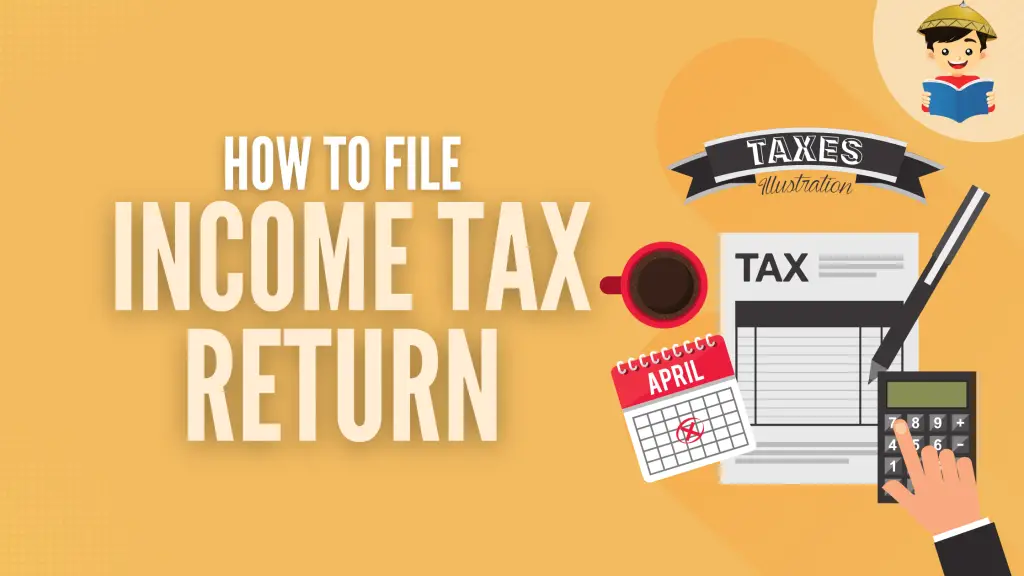
Filing taxes is like washing your dishes. It may be unpleasant, but it’s necessary.
If you’re one of those who are confused about the whole tax filing process, don’t fret. Whether you’re a fresh graduate or a first-time business owner, this guide will give you all the basics of the income tax return and how to file for one.
Disclaimer: This article is for general information only and is not substitute for professional advice.
Go back to the main article: How to File and Pay Taxes: An Ultimate Guide to Philippine Tax
Table of Contents
What Is an Income Tax Return?
An income tax return (ITR) is a document that taxpayers file with the Bureau of Internal Revenue (BIR) every quarter and every year to declare their income, profits, expenses, losses, and other important tax-related information for the past year. These figures allow taxpayers to compute the income tax they owe to the government.
Why You Should File and Pay Taxes

Filing and paying taxes is a time-consuming and complicated process in the Philippines. For instance, it took about 171 hours to prepare and pay taxes in the country in 2019, based on World Bank data1.
That’s like spending 21 eight-hour workdays or roughly a month to comply with the law. Not to mention the amount of effort (and killer math skills) that tax preparation entails.
Would you go through the pain of tax filing and payment or spare yourself the trouble?
You don’t have a choice if you’re an employee because your employer withholds your taxes through salary deduction.
But ignoring your tax obligations is tempting if you’re self-employed.
Are you having second thoughts about fulfilling your taxpayer duties? The benefits of having an ITR in the Philippines might convince you otherwise.
1. Access to loans and credit cards
An ITR is one of the financial documents usually required for loan and credit card applications. The ITR can serve as proof of income for self-employed Filipinos without payslips.
Having an ITR shows lenders that you’re earning enough income and thus can pay back your debt.
A simple document like an ITR can help you meet your urgent cash needs and long-term financial goals. Even if you don’t need a loan right now, you might do it in the future. Someday, you might have to purchase a car through an auto loan from the bank. Or you might need to get a Pag-IBIG housing loan to buy your dream home.
2. Income document for visa application
Countries like the US, Japan, South Korea, and those in the Schengen area have strict visa requirements for Filipino visitors. To enter any of these places, you must submit documents showing proof of income, including an ITR.
Want to explore more places around the world? Raise your chance of getting approved for a visa to your dream destination—file your ITR and pay your income tax.
3. Business growth
For B2B businesses, tax documents such as an ITR are usually required for accreditation as an individual contractor or supplier.
You can’t get more clients without proving that you’re correctly filing and paying your company’s income taxes.
Increasing your client base is crucial for growing your business, so ensure you’re doing your duties as a taxpayer.
For freelancers, the ability to issue an official receipt to clients gives them an edge. High-paying clients, especially large corporations, require an OR from their independent contractors.
4. Compliance with the law
If none of the tax filing and payment benefits discussed above matter to you, then the fear of penalties for tax evasion might force you to comply with the law.
The BIR fines tax evaders with 25% to 50%2 of the tax due plus a double the legal interest rate (or 12%) annual interest3 on the unpaid tax. This violation can also lead to jail time of one to ten years.
There’s also the lingering stress and anxiety that the BIR might send you a letter of notice for failure to file and/or pay income tax or, worse, order the closure of your business until you’ve filed and paid the correct taxes.
In short, filing and paying taxes properly gives you peace of mind. Instead of constantly worrying, you can focus on running and growing your business.
Who Are Required To File an ITR and Pay Taxes?

You’re required by law to file returns and pay taxes if you belong to any of these taxpayer categories:
1. Individual taxpayers.
a. Filipinos living in the Philippines and earning income from sources within and/or outside the country, including the following:
- Employees with two or more employers (whether at the same time or successively) at any time within the taxable year
- Employees with one employer or multiple employers whose income tax for the previous year has been withheld incorrectly, resulting in a tax refund or liability, during the calendar year
- Employees with one employer and whose spouse is not qualified under substituted filing, even if the income tax has been correctly withheld
- Self-employed individuals (freelancers, single proprietors, professionals, etc.) earning income from their business or profession
- Mixed-income earners receiving salaries from their employers and income from their business or profession (i.e., employees who are freelancing and running a side business at the same time) within the taxable year
- Individuals earning income from sources unrelated to a business or profession (i.e., passive income), aside from receiving a salary, that has not been subjected to final withholding tax.
b. Filipinos living or working abroad, such as OFWs and immigrants, and earning income from sources within the Philippines (Only income earned from the Philippines is taxable.)
c. Foreigners earning income from sources within the Philippines, whether they live in the country or abroad (Only income earned from the Philippines is taxable.)
2. Non-individual/Corporate taxpayers
Regardless of how they’re formed or organized, the following types of corporations and partnerships should file returns and pay income taxes:
- Domestic corporations earning income from sources within and outside the Philippines
- Foreign corporations earning income from sources within the Philippines
- Estates and trusts engaged in trade or business
Related: Different Types of Taxpayers in the Philippines
Who Is Not Required To File an ITR in the Philippines?
Not all income earners have to file an income tax return. The Tax Code4 exempts certain people from income tax filing if they meet any of these conditions:
1. Employed and self-employed individuals with an annual taxable income of Php 250,000 and below
The BIR website specifically states that a taxable income—not gross income—of Php 250,000 or below within the taxable year exempts workers from income tax filing.
Taxable income and gross income are two different things. Your gross income is your total pay (before deductions are made), while taxable income is the portion of your gross income subject to tax.
This means your tax due (gross income minus allowable deductions) must be equal to or less than Php 250,000 to be exempted from filing income tax.
2. Employees whose income tax has been withheld correctly
You don’t have to file an ITR if you have only one employer for the taxable year and your income tax has been withheld correctly (meaning your tax due at the end of the year equals the tax withheld by your employer).
3. Employees qualified for substituted filing
Substituted filing means employers file ITRs on behalf of their employees. Under the TRAIN law (Republic Act 10963), an employee is exempted from filing an annual ITR (BIR Form 1700) if these two requirements are met:
- The employee received purely compensation income, regardless of amount, from only one employer in the Philippines within the taxable year.
- The employer has withheld the income tax correctly (tax due equals tax withheld) and filed the BIR Form 2316 (Certificate of Compensation Payment/Tax Withheld).
Under the substituted filing system, the BIR Form 2316 with the “received” stamp by the BIR is considered the employee’s substitute ITR.
4. Minimum wage earners
Employees earning minimum wage (MWE) in the Philippines don’t have to file income tax. Their basic pay—as well as overtime pay, holiday pay, night differential pay, and hazard pay—are all tax-exempt.
Meanwhile, MWEs who are business owners or freelancers must file taxes.
Based on data from the National Wages and Productivity Commission5, the daily minimum wage in Metro Manila as of September 2022 is Php 467.95 for agricultural workers or Php 500.44 for non-agricultural workers.
For the rest of the country, the daily minimum wage ranges from Php 271.24 to Php 325.06 for the agricultural sector or Php 292.70 to Php 325.06 for non-agricultural sectors.
5. Taxpayers whose sole income has been subjected to final withholding tax
People who earn only certain types of income, such as lotto winnings and royalties, are already paying final withholding taxes, so filing income tax is unnecessary.
For example, someone who earns income solely through royalties from literary or musical works must file a different set of returns of final withholding taxes (Appropriate tax forms can be downloaded from the BIR website).
6. Income tax-exempt individuals
Filipinos exempted from paying income tax (under the Tax Code and other special laws) are also exempted from filing ITRs. These individuals include OFWs and immigrants whose sole income is earned outside the Philippines.
Who Are Exempted From Paying Income Tax?
The following individuals and entities are exempted from paying income tax in the Philippines:
- Filipino immigrants or permanent residents of a foreign country earning income from sources outside the Philippines
- Land-based and sea-based OFWs earning income from sources outside the Philippines
- Minimum wage earners (Aside from the basic wage, overtime pay, holiday pay, night shift differential pay, and hazard pay are also tax-exempt.)
- General professional partnerships (created by professionals for the sole purpose of practicing their common profession)
- Corporations enumerated in Section 30 of the Tax Code
- Those enjoying income tax holidays (i.e., BMBE, PEZA, BOI, etc.)
- Building and loans associations whose accounts are guaranteed by Home Guaranty Corporation
- Social Security System (SSS)
- Government Service Insurance System (GSIS)
- Philippine Health Insurance Corporation (PHIC or PhilHealth)
- Local Water Districts
Related: How to Apply for Tax Exemption in the Philippines
What Are the Tax Forms and Requirements Needed When Filing an Income Tax Return?
1. Annual Income Tax Filing Using BIR Form 1700
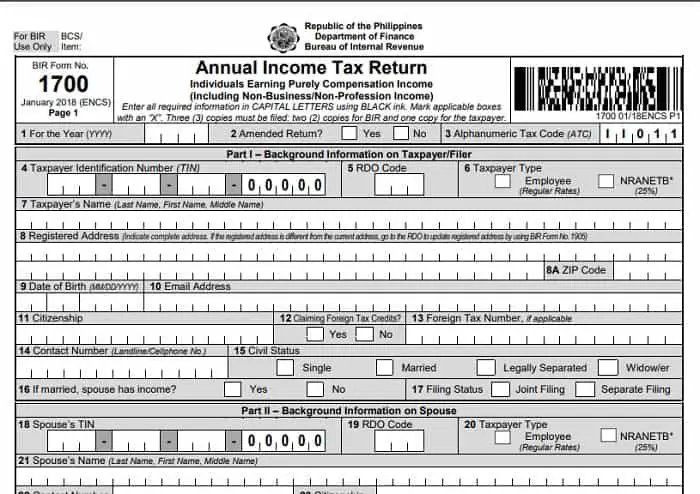
a. What is the purpose of BIR Form 1700?
The BIR Form 1700 is the annual income tax return used by employees earning solely compensation income who don’t qualify for substituted filing. It should be filed on or before April 15 every year, covering income for the previous taxable year.
b. Who should file BIR Form 1700?
Certain employees are required to file the BIR Form 1700 on their own under any of the following circumstances:
- The employee receives compensation income from two or more employers (whether at the same time or one after another) within the taxable year
- The income tax has been withheld incorrectly, leading to either a tax refund or tax liability, whether the employee worked for one employer or multiple employers within the taxable year
- The employee earned passive income (aside from employment income) that has not been subjected to final withholding tax
- The employee’s spouse doesn’t qualify for substituted filing, even if the employee has one employer and his/her income tax has been withheld correctly
- Non-resident foreign employees sent by a foreign corporation to work for its regional office in the Philippines
c. Requirements for filing BIR Form 1700
- Three copies of accomplished BIR Form 1700
- Accomplished BIR Form 2316 (Certificate of Compensation Payment/Tax Withheld)
- For those paying tax using tax credit certificates: Approved tax debit memo
- For non-resident foreigners: Proof of foreign tax credits
- For taxpayers filing an amended return for the same year: Previously filed ITR and proof of tax payment
2. Annual Income Tax Filing Using BIR Form 1701
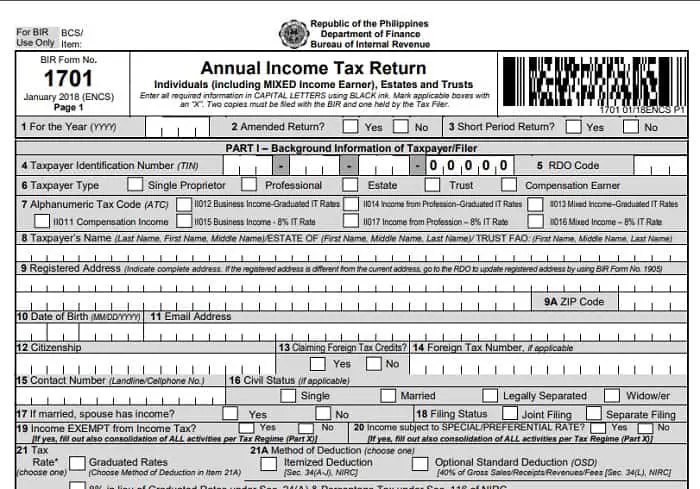
a. What is the purpose of BIR Form 1701?
The BIR Form 1701 is the return that self-employed individuals, mixed-income earners, estates, and trusts use to file their annual income tax regardless of gross income. It should be filed every year on or before April 15, covering income for the previous taxable year.
b. Who should file BIR Form 1701?
- Self-employed taxpayers (such as freelancers, sole proprietors, and professionals) availing of the itemized deduction under the graduated income tax rates
- Mixed-income earners
- Administrators or executors of an estate engaged in trade or business
- Trustees of trusts, guardians of minors, or anyone who has a fiduciary relationship with a beneficiary engaged in trade or business
c. Requirements for filing BIR Form 1701
- Three copies of accomplished BIR Form 1701
- For taxpayers with gross annual sales or receipts of Php 3 million and below: Three copies of accomplished BIR Form 1701 AIF (Account Information Form)
- For taxpayers with gross annual sales or receipts of over Php 3 million: Certificate of an independent CPA with audited financial statements
- Accomplished BIR Form 2316 (Certificate of Compensation Payment/Tax Withheld), if applicable
- Accomplished BIR Form 2304 (Certificate of Income Payment Not Subject to Withholding Tax), if applicable
- Accomplished BIR Form 2307 (Certificate of Creditable Tax Withheld at Source), if applicable
- For those paying tax using tax credit certificates: Approved tax debit memo
- For non-resident foreigners: Proof of foreign tax credits
- For taxpayers filing an amended return for the same year: Previously filed ITR and proof of tax payment
- Proof of the previous year’s excess tax credits, if applicable
3. Annual Income Tax Filing Using BIR Form 1701A
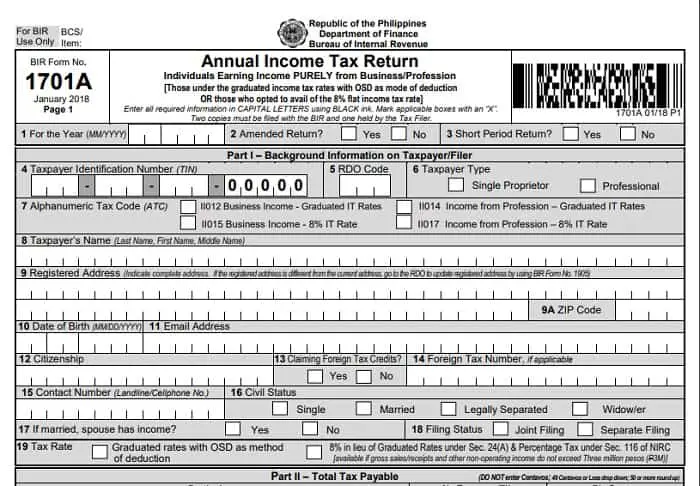
a. What is the purpose of BIR Form 1701A?
The BIR Form 1701A is the annual income tax return taxpayers earning solely business or professional income file on or before April 15 every year, covering their income for the previous taxable year.
This newly released tax return should not be confused with the BIR Form 1701. Although these tax forms serve the same purpose, the right return to use depends on the taxpayer’s choice of the tax rate (whether graduated tax rate or 8% flat rate) and method of deduction (whether itemized deduction or 40% optional standard deduction).
b. Who should file BIR Form 1701A?
Only self-employed taxpayers who avail of any of the following options may use the BIR Form 1701A:
- The optional standard deduction under the graduated tax rates, regardless of gross sales/receipts and other non-operating income
- 8% flat income tax rate, whose gross sales/receipts and other non-operating income don’t exceed Php 3 million
c. Requirements for filing BIR Form 1701A
- Three copies of accomplished BIR Form 1701A
- Accomplished BIR Form 2316 (Certificate of Compensation Payment/Tax Withheld), if applicable
- Accomplished BIR Form 2304 (Certificate of Income Payment Not Subject to Withholding Tax), if applicable
- Accomplished BIR Form 2307 (Certificate of Creditable Tax Withheld at Source), if applicable
- For those paying tax using tax credit certificates: Approved tax debit memo
- For non-resident foreigners: Proof of foreign tax credits
- For taxpayers filing an amended return for the same year: Previously filed ITR and proof of tax payment
- Proof of the previous year’s excess tax credits, if applicable
4. Annual Income Tax Filing Using BIR Form 1701Q
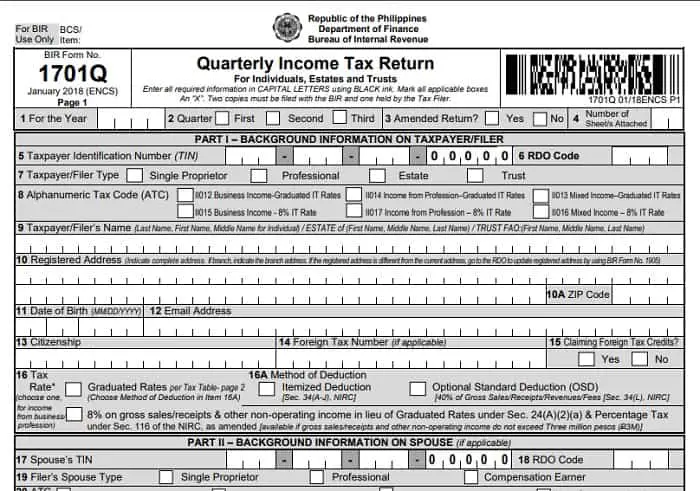
a. What is the purpose of BIR Form 1701Q?
The BIR Form 1701Q is the income tax return that self-employed individuals, mixed-income earners, estates, and trusts file quarterly in addition to their annual ITR.
It’s filed on or before May 15 (for the first quarter), August 15 (for the second quarter), and November 15 (for the third quarter) of the current taxable year.
The first quarterly ITR is crucial because it’s where you’ll indicate your preferred income tax rate (graduated rates or 8% flat rate). If you opt for the graduated rates, you’ll also have to choose between two methods of deduction (itemized deduction or optional standard deduction).
Once you’ve made a choice, it can no longer be changed within the taxable year, except when your gross sales/receipts exceed Php 3 million (which will automatically adjust to the graduated rates if you initially chose the 8% flat rate).
Your chosen tax rate (and deduction method, if you avail of graduated rates) is what you’ll also indicate in your annual ITR.
If you change your mind, you’ll have to wait another year to switch to a different tax rate option, which you can do only when filing the first quarterly ITR for the following year.
b. Who should file BIR Form 1701Q?
- Self-employed taxpayers
- Mixed-income earners
- Administrators or executors of an estate engaged in trade or business
- Trustees of trusts, guardians of minors, or anyone with a fiduciary relationship with a beneficiary involved in trade or business
c. Requirements for filing BIR Form 1701Q
- Three copies of accomplished BIR Form 1701Q
- Accomplished BIR Form 2307 (Certificate of Creditable Tax Withheld at Source), if applicable
- For those paying tax using tax credit certificates: Approved tax debit memo
- Proof of other payment/s made, if applicable
- Summary Alphalist of Withholding Agents of Income Payments Subjected to Withholding Tax at Source (SAWT), if applicable (downloadable from the BIR website)
How To File Income Tax Return Philippines: 3 Ways
There are three ways to pay taxes and file ITR for taxpayers in the Philippines: eFPS, eBIRForms, and manual.
1. Manual Filing
Manual filing involves personally submitting your accomplished ITR. This tax-filing method is the alternative option when eFPS and eBIRForms are down or unavailable.
Also, if the latest version of a specific ITR is not yet available in the eFPS and eBIRForms facilities, taxpayers must file it manually.
How To File and Pay ITR Manually
- Download the PDF file of the appropriate ITR from the BIR website (see the previous section).
- Print three copies of the ITR.
- Fill out the appropriate fields.
- Go to the nearest authorized agent bank (AAB) under the jurisdiction of the Revenue District Office (RDO) where you’re registered. If there’s no AAB in your area, visit the Revenue Collection Officer or authorized city/municipal treasurer in your RDO.
- Submit your accomplished ITR plus the requirements.
- Pay your tax due.
- Receive your copy of the stamped and validated ITR and deposit slip from the teller (or Electronic Revenue Official Receipt or eROR if you paid tax in the RDO).
2. Electronic Filing and Payment System (eFPS)
Only available to specific types of taxpayers (excluding freelancers and small business owners), the BIR eFPS provides a convenient way of filing and paying taxes online. It eliminates the hassle of manual filing and the risk of human error as it validates taxpayers’ data before transmitting them to BIR. Read more about eFPS here.
3. Electronic BIR Forms (eBIRForms)
eBIRForms is a tax preparation software you can download on your computer. It enables taxpayers, specifically those not qualified to use the eFPS, to file their tax returns offline or online. Read more about eBIRForms here.
Tips and Warnings
1. File and pay taxes at least three days before the deadline
Usually, the BIR does not extend tax deadlines. So if you miss the due date, you’re bound to pay the penalties for late filing6.
We all know about the April 15 deadline for paying annual income tax. However, there are loads of deadlines for other types of taxes that all taxpayers need to remember.
So that you won’t file and pay your taxes late, keep a calendar of tax deadlines at hand. The BIR has an official tax calendar, which you can find on the BIR website’s homepage.
Why should you file and pay taxes at least three days ahead of the due date?
You’ll encounter problems using the BIR’s e-filing facilities (eFPS and eBIRForms) due to network congestion when you file and pay your tax at the last minute.
Doing it manually doesn’t improve on the last day of filing—you’ll be lining up at the RDO for hours without an assurance that you’ll make it to the deadline.
Thus, filing and paying your tax returns as early as possible is important to avoid inconveniences and penalties.
2. File your tax returns at the correct venue
Where you file and pay your taxes is just as crucial as when you do it.
Filing at a Revenue District Office (RDO) other than where you’re registered will cost you a compromise penalty of Php 1,000 – Php 50,000 depending on the gross sales plus a 25% surcharge of the tax due and a 12% annual interest on unpaid tax7. This means you’ll be paying hefty penalties if your tax due is worth hundreds of thousands or millions of pesos.
The penalties also apply to taxpayers who are mandated to file tax returns using the eFPS or eBIRForms but filed manually instead.
Before filing your ITR, ensure you’re going to the proper venue. Contact the BIR hotline or visit the nearest RDO to verify which RDO you’re currently registered with.
Once your correct RDO is confirmed, file your ITR with any authorized agent bank (AAB) within your RDO’s area of jurisdiction. If there’s no AAB in your area, file your return with the Revenue Collection Officer in your RDO.
Tax returns of non-resident foreigners who earn income from the Philippines must be filed with RDO No. 039 in South Quezon City or the Office of the Commissioner at the BIR National Office Building, BIR Road, Diliman, Quezon City.
Taxpayers required to file through eFPS or eBIRForms should avoid filing manually, except when the system is down, and the BIR has released an advisory on manual filing.
Related: How to Get BIR RDO Code: An Updated List of Revenue District Offices in the Philippines
3. Use an online tax preparation service for easier tax filing
Every step in the tax preparation process—from computing your tax due and filling out to filing tax returns—is tedious and complicated. For self-employed and mixed-income taxpayers, this can waste precious time and energy they could have otherwise used to grow their businesses or improve their skills.
Fortunately, you don’t have to do everything by yourself. Browser-based platforms and mobile apps for tax filing are now available for taxpayers to use on their computers or smartphones.
These online tax preparation services help file ITRs by automating the process, saving a busy taxpayer’s time and sanity. This way, self-employed persons can focus on running and growing their businesses.
Today’s most well-known online tax filing platforms are Taxumo, Moneygment app, JuanTax, and Tax Whiz app.
Generally, here’s how an online tax filing service works: You encode your income, expenses, and other relevant tax data on the platform, and it automatically fills out the tax return, computes the tax due, and files your ITR for you. The online platform also enables the scanning and uploading receipts, bills, invoices, and other supporting documents for easier tracking of business expenses.
For their convenience, online tax preparation services charge a fee ranging from Php 100 to Php 5,000 per transaction, depending on your package.
4. Non-filing of ITR is punishable by the law
Failure to file your Income Tax Return has consequences according to our law. The Department of Finance highlighted that non-filing of ITR is a crime8. Section 255 of the National Internal Revenue Code states that any person who is required to file an ITR and fails to do so will be fined an amount not exceeding Php 10,000 and imprisoned for not less than one year but not more than ten years.
Frequently Asked Questions
1. What is the difference between BIR Form 1701 and BIR Form 1701A? Which ITR should I use?
When the BIR released the BIR Form 1701A in early 2019, it stirred some confusion. Previously, all self-employed and mixed-income earners had used the BIR Form 1701 to file their income tax. But now, there are two seemingly similar tax forms to accomplish.
So, which is the correct form to use?
First off, BIR Forms 1701 and 1701A are different from each other. Each covers different types of taxpayers, tax rates, and deduction methods.
For your quick reference, here’s a table showing which of the two BIR forms you should be filing: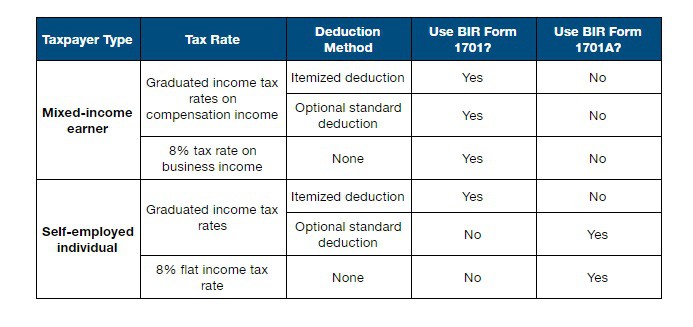
As you can see, all mixed-income earners—regardless of the chosen tax rate and deduction method—should file the BIR Form 1701. Self-employed individuals can use the BIR Form 1701 or BIR Form 1701A depending on their tax rate selected and deduction method.
To summarize:
*BIR Form 1701 – For self-employed taxpayers availing of itemized deduction under graduated tax rates
*BIR Form 1701A – For self-employed taxpayers availing of optional standard deduction under graduated tax rates OR the 8% preferential tax rate
2. I have no tax payable. Do I still need to file an ITR? How?
Even if you end up with no tax due after computing your income tax, you must still file a no-payment return with the BIR.
The filing procedure for ITR with no payment is similar to a filing with tax payment, regardless of method (eFPS/eBIRForms/manual). The deadline for the annual ITR is also the same: April 15 of every year.
The only difference between filing an ITR with payment and with no payment, aside from non-payment of tax, is the venue where you’ll file your no-payment return.
No payment returns should be filed directly with the RDO where you’re registered. Whether you have tax due or not, the BIR officer should stamp “Received” on your ITR upon filing.
References
- Time to prepare and pay taxes (hours). (2019). Retrieved 5 September 2021, from https://data.worldbank.org/indicator/IC.TAX.DURS
- National Internal Revenue Code (1997), Section 248
- National Internal Revenue Code (1997), Section 249
- National Internal Revenue Code (1997), Section 51, (A) (2)
- Current Real Minimum Wage Rates. (2022, September). Retrieved April 15, 2023, from https://nwpc.dole.gov.ph/stats/current-real-minimum-wage-rates/
- Penalties for Late Filing of Tax Returns. Retrieved 5 September 2021, from https://www.bir.gov.ph/index.php/penalties.html
- National Internal Revenue Code (1997), Section 255 and Revenue Memorandum Order 7-2015
- Public told: File your ITR or be fined, jailed. (2022). Retrieved 27 February 2022, from https://www.cnnphilippines.com/news/2022/2/14/BIR-ITR-penalty.html
Written by Venus Zoleta
in Accounting and Taxation, BIR, Government Services, Juander How
Venus Zoleta
Venus Zoleta is an experienced writer and editor for over 10 years, covering topics on personal finance, travel, government services, and digital marketing. Her background is in journalism and corporate communications. In her early 20s, she started investing and purchased a home. Now, she advocates financial literacy for Filipinos and shares her knowledge online. When she's not working, Venus bonds with her pet cats and binges on Korean dramas and Pinoy rom-coms.
Copyright Notice
All materials contained on this site are protected by the Republic of the Philippines copyright law and may not be reproduced, distributed, transmitted, displayed, published, or broadcast without the prior written permission of filipiknow.net or in the case of third party materials, the owner of that content. You may not alter or remove any trademark, copyright, or other notice from copies of the content. Be warned that we have already reported and helped terminate several websites and YouTube channels for blatantly stealing our content. If you wish to use filipiknow.net content for commercial purposes, such as for content syndication, etc., please contact us at legal(at)filipiknow(dot)net
